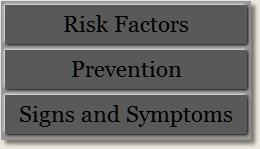




War Against Melanoma
The WAM Foundation
1478 Sunflower Street Lewis Center, OH 43035
Email: info@thewamfoundation.org
1478 Sunflower Street Lewis Center, OH 43035
Email: info@thewamfoundation.org
Prevention
Information on this site was obtained directly from the National Cancer Institute and The Skin Cancer Foundation, two excellent resources for detailed
information about melanoma. For more information, please go to:
National Cancer Institute - http://www.cancer.gov/cancertopics/types/melanoma
The Skin Cancer Foundation - http://www.skincancer.org
Disclaimer: The material contained on this site is for informational purposes only and is not intended and should not be construed to be a substitute for professional medical advice, diagnosis or treatment. You should not rely on any information contained on this site as a substitute for medical advice and always seek the advice of your physician or other qualified health provider with any questions or concerns you may have regarding a medical condition.
National Cancer Institute - http://www.cancer.gov/cancertopics/types/melanoma
The Skin Cancer Foundation - http://www.skincancer.org
Disclaimer: The material contained on this site is for informational purposes only and is not intended and should not be construed to be a substitute for professional medical advice, diagnosis or treatment. You should not rely on any information contained on this site as a substitute for medical advice and always seek the advice of your physician or other qualified health provider with any questions or concerns you may have regarding a medical condition.
People with skin cancer are at risk of developing another skin cancer. Limit your time
in the sun and stay away from sunlamps and tanning booths. Keep in mind that
getting a tan may increase your risk of developing another skin cancer.
* Avoid outdoor activities during the middle of the day. The sun's rays are the strongest between 10 a.m. and 4 p.m. When
you must be outdoors, seek shade when you can.
* Protect yourself from the sun's rays reflected by sand, water, snow, ice, and pavement. The sun's rays can go through light clothing, windshields, windows, and clouds.
* Wear long sleeves and long pants. Tightly woven fabrics are best. Wear a hat with a wide brim all around that shades your face, neck, and ears. Keep in mind that baseball caps and some sun visors protect only parts of your skin.
* Wear sunglasses that absorb UV radiation to protect the skin around your eyes. o Use sunscreen lotions with a sun protection factor (SPF) of at least 15. (Some doctors will suggest using a lotion with an SPF of at least 30.) Apply the product's recommended amount to uncovered skin 30 minutes before going outside, and apply again every two hours or after swimming or sweating.
* Sunscreen lotions may help prevent some skin cancers. It's important to use a broad-spectrum sunscreen lotion that filters both UVB and UVA radiation. But you still need to avoid the sun during the middle of the day and wear clothing to protect your skin.
* Examine your skin head-to-toe every month.
* See your physician every year for a professional skin exam.
Click here for a good article about the importance of skin screenings.
* Protect yourself from the sun's rays reflected by sand, water, snow, ice, and pavement. The sun's rays can go through light clothing, windshields, windows, and clouds.
* Wear long sleeves and long pants. Tightly woven fabrics are best. Wear a hat with a wide brim all around that shades your face, neck, and ears. Keep in mind that baseball caps and some sun visors protect only parts of your skin.
* Wear sunglasses that absorb UV radiation to protect the skin around your eyes. o Use sunscreen lotions with a sun protection factor (SPF) of at least 15. (Some doctors will suggest using a lotion with an SPF of at least 30.) Apply the product's recommended amount to uncovered skin 30 minutes before going outside, and apply again every two hours or after swimming or sweating.
* Sunscreen lotions may help prevent some skin cancers. It's important to use a broad-spectrum sunscreen lotion that filters both UVB and UVA radiation. But you still need to avoid the sun during the middle of the day and wear clothing to protect your skin.
* Examine your skin head-to-toe every month.
* See your physician every year for a professional skin exam.
Click here for a good article about the importance of skin screenings.
The best way to prevent skin cancer is to protect yourself from the sun:








